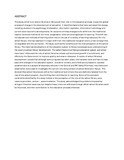| dc.description.abstract | This study which is on school libraries in Kenya and
their role in the education process, traces the global process of
change in the development of education. It identifies factors
that have activated this change including studies in the
psychology of education, information explosion, information
technology and current socio-economic developments.
An outcome of these changes is the shift from the
traditional teacher-centered method to the more 'progressive'
child-centred approach to learning. This shift has introduced new
methods of learning which rely on the use of a variety of
learning resources. For the school library, this has resulted in
a major shift from the traditional marginal role to a new
concept that is inteqrated with the curriculum. The study
outlines the conditions of the new perception of the school
library.
The historical development of the education system in
Kenya is analysed as an underpinning of the county's school
library development. The salient feature's of Kenya's education
system and which have have' influenced the role of school
libraries include a phenomenal growth in enrollments, and efforts
by the Government to improve quality and ensure relevance.
A review of school libraries! development reveals that
although some progress has taken place, this has been slow and
has not kept pace with changes in the education system.
Literature reviews, and a field survey based on a postal
questionnaire to a sample of secondary schools in the Central and
Rift Valley Provinces, interviews and observation were used to
investigate the current role and provision of school libraries in
Kenya. This showed that school libraries are still at the
traditional level where they are distinctly isolated from the
rest of the school program, thus limiting their contribution to
learning. Some of the prevalent constraints identified by the
study include a low perception of the role of the school library,
poor resource provision, and po~. accommodation. The study
acknowledges the problems imposed by stringent financial
resources, but despite these, there are still ways through which
school libraries could be improved, and their contribution to the
education process enhanced. | en |

